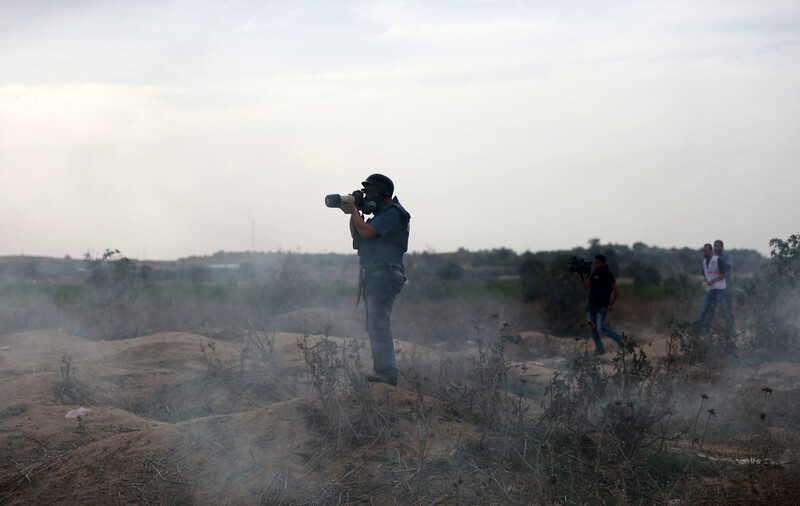Activism and BDS Beat 21 August 2017

A Palestinian photographer works amid tear gas fired by Israeli forces during confrontations with Palestinian protesters near the boundary between Israel and the central Gaza Strip, October 2015.
APA imagesMore than 40 Portuguese photographers, photography teachers and students have launched a pledge to reject professional invitations or funding from the Israeli state, and to refuse to collaborate with Israeli institutions complicit in Israel’s regime of occupation, colonialism and apartheid.
The photographers are pledging to boycott Israel until it “complies with international law and respects the human rights of Palestinians.”
They are urging other photographers to join the call, which they launched to coincide with World Photo Day on Saturday, an annual celebration of the transformative influence of photography.
Their pledge comes in response to the Palestinian call for a cultural boycott of Israel, as Israel uses culture to whitewash and obscure its violations of Palestinian rights.
Photographers “can no longer be silent”
Those supporting the pledge include João Pina, winner of the 2017 Prémio Estação Imagem Viana do Castelo, Portugal’s only photojournalism award, and Nuno Lobito, a photographer and television personality who has traveled to almost every country in the world.
“It is time for Israel’s brand of apartheid to enjoy the same treatment as South African apartheid and be target of a comprehensive international boycott until it respects human rights,” Lobito said.
“Photographers can no longer be silent about the treatment of their Palestinian colleagues living under an indefensible occupation that has lasted for over half a century,” Lobito added.
“Palestinians have called for solidarity through boycotts and this pledge is our practical contribution to their struggle.”
Attacks on photographers
Palestinian arts photographers, photojournalists and videographers have been frequent targets of violence by Israeli occupation forces.
In 2014, the year it launched a massive military assault on Gaza, Israel was the second most lethal country in the world for journalists.
In May this year, an Israeli settler shot and injured Majdi Mohammed, a photographer for the Associated Press, while he was covering a protest near the occupied West Bank city of Nablus.
The settler shot dead a Palestinian protester in the same incident.
The Committee to Protect Journalists condemned Israeli occupation forces’ inaction toward the suspected shooter.
“Israeli authorities should not allow a man who by his own admission shot at a crowd, injuring a journalist and killing a young man, to rest comfortably at home, unmolested by police,” the group’s Middle East and North Africa coordinator Sherif Mansour said.
“Israel must show that its citizens cannot shoot journalists or other unarmed civilians with impunity.”
Unprovoked attacks on press photographers and journalists by Israeli occupation forces have been met with similar impunity.
“Natural step”
Last month, there was a surge in attacks on journalists, including photographers, by Israeli forces who reacted with violence to Palestinian civil disobedience against tightened restrictions on entry to Jerusalem’s al-Aqsa mosque compound.
Earlier this month, Oren Ziv, a photographer with the collective ActiveStills, told The Electronic Intifada that Israeli soldiers and police regularly attack Palestinian and other journalists who cover smaller Palestinian demonstrations, but the events in Jerusalem were unusual because of the wide attention they received.
Miguel Carriço, winner of the 2012 Concelho da Bienal de Vila Franca de Xira award, urged fellow photographers to observe the boycott.
“Having witnessed first-hand the crimes Israel is committing daily against Palestinians, signing up to this initiative has become a natural step,” Carriço said.
“It is fundamental to promote this effort through all means possible.”





Comments
Tribute to the Portugese photographers!
Permalink Amin replied on
Glad to know that there are still people with a conscience who do not look the other way for the crimes that Israel is making daily against the Palestinian people. Tribute to the Portuguese photographers!
another small step toward justice
Permalink tom hall replied on
The cultural dimension of BDS is one that Israel's rulers fear greatly. They understand that a boycott by artists and other intellectual workers will dramatically undermine support for the apartheid state. This pledge by Portuguese photographers, teachers and students to observe the call for a boycott of Israel is now added to numerous other declarations around the world, and is most welcome.